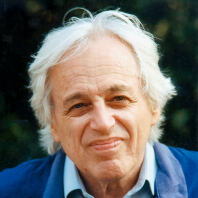György Ligeti
composer
György Ligeti caused an international sensation from the 1960s onwards and rose to become one of the most frequently performed composers of the 20th century. The Hungarian, whose iridescent musical visions Stanley Kubrick used – without permission – as film music in his science fiction parable 2001: A Space Odyssey, was an exceptional figure of the avant-garde. Again and again, he stepped out of the mainstream of Modernism in order to observe the current moment from a distance.
György Ligeti, born in Dicsőszentmárton in 1923 as the son of Hungarian-Jewish left-wing intellectuals, actually wanted to become a biochemist or mathematician. When he was refused admission to a university course in the natural sciences because of his Jewish ancestry, despite having passed the entrance examination, he successfully applied to the more liberal conservatoire. During the Second World War, he narrowly escaped death on several occasions – his father and younger brother were murdered in concentration camps, while his mother survived Auschwitz. As a student in Budapest, Ligeti then endured the repressive measures of Soviet cultural policy, which is why he initially composed with no hope of his works being performed. After the Hungarian uprising in 1956, he decided to go into exile and a few months later became a member of staff at the WDR’s Studio for Electronic Music in Cologne. His international breakthrough finally came in 1961 with his spectacular orchestral piece Atmosphères, which even had to be repeated at its premiere at the Donaueschinger Musiktage. In addition to his compositional successes, Ligeti taught. He was a visiting professor at the Royal Swedish Academy of Music and subsequently lived in Berlin on a DAAD scholarship before being appointed composer in residence at Stanford University in California. The fact that the composer then took over a composition class as a professor at the Hochschule für Musik und Theater in Hamburg for 16 years was ultimately only due to the fact that the Berlin music college had not sent a contract in time: “My home”, he once said, “is actually Berlin”. Ligeti died in Vienna in 2006.